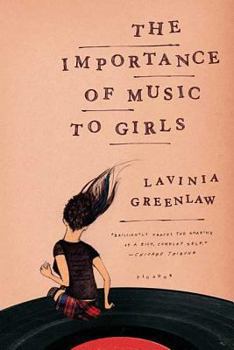The Importance of Music to Girls
Select Format
Select Condition 
Book Overview
If I had not kissed anyone, or danced with anyone, or had a reason to cry, the music made me feel as if I had gone through all that anyway . . . the music attracted and repelled, organised and... This description may be from another edition of this product.
Format:Paperback
Language:English
ISBN:0312428375
ISBN13:9780312428372
Release Date:May 2009
Publisher:St. Martins Press-3PL
Length:224 Pages
Weight:0.46 lbs.
Dimensions:0.7" x 5.5" x 8.4"
Customer Reviews
3 ratings
a great read for music lovers
Published by Thriftbooks.com User , 15 years ago
'The Importance of Music to Girls' is an insight into growing up in the 1960s and 1970s in the UK, from the perspective of a girl to whom music meant everything. It is an interesting read and more than just a memoir; more of a social history book. I would recommend it to anyone who has ever loved music above all else.
The importance of music, period.
Published by Thriftbooks.com User , 15 years ago
When I looked at the inner-flap of this book, I was immediately intruigued and picked this up, I mean what is (potentially) not to like about a memoir on growing up with music. In "The Importance of Music to Girls" (208 pages), author Lavinia Greenlaw brings her recollections of what it was like growing up with music, and how it shaped and influenced her, in the 1960-1970s of her native England. The book takes a while to find its groove, but when it does so, about one-third into it, it all really clicks, and from there on it became an engrossing read, and treat, for me, particulary since it appears the author differs only 2 years or so from me (I grew up in Belgium). So many of the music names and memories that she retells in turn brought back memories for me I hadn't thought of in a LONG time. Along the way there are the usual boy/girl and school adventures and problems, but it is a sidebar for me as I was reading the book. Here just a couple of snippets that made me chuckle: about listening to the radio as a teenager: "From Radio Luxembourg, I moved on to pirate station Radio Caroline. It was illegal, and broadcast from a boat just out there off the Essex coast. Its DJs never sounded silly or romantic, and rarely cheerful. They were improvisatory, and they never played the usual chart hits." About appreciating music: "Until now I hadn't given much thought to producers. I'd heard of Phil Spector and his "Wall of Sound" and admired Quincy Jones, but didn't understand what they did. Then I read about Martin Hennet and saw his names on records by Joy Division, the Buzzcocks and Magazine. I began to listen differently, like someone who has grasped prosody reads a poem differently". In all, I really connected with this book, and would recommend it to anyone who grew up with music being an important aspect of their life. In that sense, the title of the book is really deficient, in that this is not just "for girls".
F*** art, let's dance.
Published by Thriftbooks.com User , 15 years ago
The Importance of Music to Girls, by Lavinia Greenlaw is a memoir not so much of childhood and adolescence, but of her developing relationship with music in 1970s Britain. There are plenty of reviews out there, and they're generally mixed. The Importance of Music to Girls made Salon.com's Summer Reads; but was skewered in London's The Independent. My reflections do not diverge much from this farraginous example. I had a dickens of a time maintaining my interest at the outset of the memoir. I'm not sure if that's entirely Greenlaw's fault or my own. Her storytelling certainly became more clear, coherent and less ethereal as her remembered-self ages. The book is divided into more than fifty chapters; constituent essays on a theme. Each essay is prefaced by a quote, some more esoteric ("very good") than others. Part of me wonders whether she meant them ironically (Roland Barthes? Bullfinch's Mythology?), or if that was the effect of having read her teenage-punk self's preoccupation with irony in the latter portion of the book. A creative writing professor and poet, Greenlaw is very much a writer I would like to know more about. So, I read her slender memoir with a critical eye towards form and function. Effect was lovely if not muted, which surprised me. For one having written a memoir about her journey through the landscape of dance hall discos and London punk, Greenlaw's tone is surprisingly subdued. I understand, from a writer's perspective, the urge to not draw the world too deeply into the wounds, scars, and dissymmetries of one's experience. Alternately, perhaps she wished to exude the post-modern detachment she experienced as a confused adolescent who depended so heavily on album cover art to interpret which mode of femininity was acceptable. But with a title that makes such a sweeping statement that promises, de facto, to give a glimpse into, well, the importance of music to girls, I found myself wanting the words which may help me access the synaesthesia, angst, and release, and acceptance Greenlaw experienced through music. Perhaps no words can fit that bill. Her writing is beautiful, though. Despite the failures of the The Importance of Music to Girls, I enjoyed reading it. And, I learned something stylistically. At the end of the day, that's enough for me.





